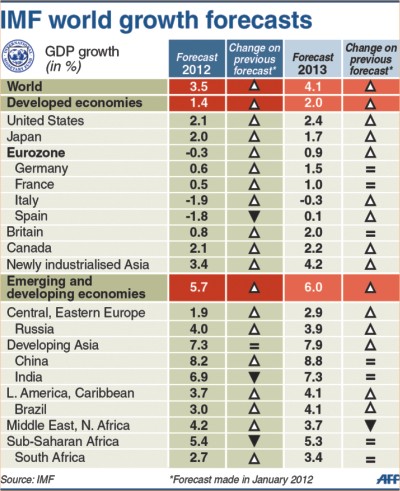Asian economies to weather global storms: IMF
 The International Monetary Fund yesterday raised its global growth forecast, with the US boosting the outlook but Asian emerging economies facing slower economic expansion.
The International Monetary Fund yesterday raised its global growth forecast, with the US boosting the outlook but Asian emerging economies facing slower economic expansion.
The world economy will expand 3.5 percent this year and 4.1 percent in 2013, the IMF said in its April 2012 World Economic Outlook yesterday ahead of the Spring Meetings of the IMF and the World Bank in Washington.
Prospects for the global economy are slowly improving again, but growth is expected to be weak, especially in Europe, and unemployment in many advanced economies will stay high, according to the IMF's latest forecast.
“For the past six months we've been on a rollercoaster ride,” said IMF Chief Economist Olivier Blanchard. “Our baseline is that growth is going to be slow in advanced economies; sustained, but not great, in emerging market and developing economies. But the risk of things turning bad again in Europe is high.”
US economic growth is projected at 2.1 percent in 2012 and 2.5 percent next year, reflecting ongoing fiscal consolidation and continued weakness in housing prices.
On Asia, the report said, weaker external demand has dimmed the outlook for Asia. But resilient domestic demand in China, limited financial spillovers, room for policy easing, and the capacity of Asian banks to step in as European banks de-leverage suggest that the soft landing under way is likely to continue.
Overall, growth in Asia will average 6.0 percent, with China slowing to 8.2 percent and India to 6.9 percent.
The region's emerging economies suffered spillover effects in 2011 from the euro zone crisis, which hit exports to Europe and also pinched trade credit and project finance as European banks were forced to retrench, the report said.
An escalation of the Eurozone crisis could lower emerging Asia's output by 1.25 percent, said the IMF, which also warned of the risks of an oil price spike from tensions in the Middle East.
"The fragility of the external outlook highlights the need for the region to rebalance growth by strengthening domestic sources of demand over the coming years," it said.
The report said many Asian economies could also advance their plans to boost social safety nets and increase investment in infrastructure if another round of fiscal stimulus is warranted.
Another flare-up of the Eurozone sovereign debt crisis or sharp escalation in oil prices on geopolitical uncertainty could easily undermine confidence and disrupt the improving growth path for world economy, the IMF said.
"With the passing of the crisis and some good news about economy, some optimism has returned. It should remain tempered," said Blanchard.
"Even absent another European crisis, most advanced economies still face major brakes on growth. And the risk of another crisis is still very much present and could well affect both advanced and emerging economies," he said.
The IMF said the most immediate concern is still that further escalation of the euro-area crisis would trigger a much more generalised flight from risk. “Geopolitical uncertainty could trigger a sharp increase in oil prices.”
A 50 percent increase in the cost of oil would reduce global output by 1.25 percent, according to the report.
The report said that governments should strengthen policies to solidify the weak recovery and contain potential risks that can weigh on consumer and investor confidence.
Advanced economies should implement medium-term budgetary savings, but not in a way that could undermine the recovery. In developing countries and emerging markets, policies should be geared toward ensuring a soft landing for economies that have seen sustained, very strong credit growth, it said.
The IMF also said Asian nations face elevated price pressures that will constrain monetary easing even as the growth outlook for the region dims.
“Although monetary tightening has been appropriately paused in many Asian economies, and cautiously reversed in some, room for further easing is constrained in economies where underlying inflation pressures remain,” it said.
The Daily Star/Bangladesh/ 18th April 2012
Other Posts
- The 39th ATM Booth of Mercantile Bank Limited
- Pubali goes big in online banking
- Premier Bank declares 22pc dividend
- BB to complete LoIs for new banks todayOriginal licence in three months, if conditions fulfilled
- Japan commits $60b to boost IMF firepower
- WB picks Kim as president
- Destiny writ over BB report rejected




Comments